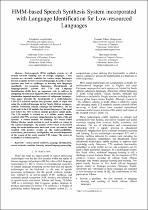 ResearchSpace
ResearchSpace
HMM-based speech synthesis system incorporated with language identification for low-resourced languages
JavaScript is disabled for your browser. Some features of this site may not work without it.
- ResearchSpace
- →
- Research Publications/Outputs
- →
- Conference Publications
- →
- View Item
| dc.contributor.author |
Sefara, Tshephisho J

|
|
| dc.contributor.author |
Mokgonyane, TB

|
|
| dc.contributor.author |
Manamela, MJ

|
|
| dc.contributor.author |
Modipa, TI

|
|
| dc.date.accessioned | 2019-11-18T05:49:04Z | |
| dc.date.available | 2019-11-18T05:49:04Z | |
| dc.date.issued | 2019-08 | |
| dc.identifier.citation | Sefara, T.J., Mokgonyane, T.B., Manamela, M.J. & Modipa, T.I. 2019. HMM-based speech synthesis system incorporated with language identification for low-resourced languages. In: 2019 International Conference on Advances in Big Data, Computing and Data Communication Systems (icABCD), Winterton, South Africa, 5-6 August 2019 | en_US |
| dc.identifier.isbn | 978-1-5386-9236-3 | |
| dc.identifier.isbn | 978-1-5386-9237-0 | |
| dc.identifier.uri | https://ieeexplore.ieee.org/document/8851055 | |
| dc.identifier.uri | DOI: 10.1109/ICABCD.2019.8851055 | |
| dc.identifier.uri | http://hdl.handle.net/10204/11218 | |
| dc.description | Copyright: 2019 IEEE. Due to copyright restrictions, the attached PDF file only contains the accepted version of the published item. For access to the published version, kindly consult the publisher's website. The definitive version of the work is published PositionIT, pp 26-29.Presented in: 2019 International Conference on Advances in Big Data, Computing and Data Communication Systems (icABCD), Winterton, South Africa, 5-6 August 2019. The url is https://ieeexplore.ieee.org/document/8851055 | en_US |
| dc.description.abstract | Text-to-speech (TTS) synthesis systems are of benefit towards learning new or foreign languages. These systems are currently available for various major languages but not available for low-resourced languages. Scarcity of these systems may lead to challenges in learning new languages specifically low-resourced languages. Development of language-specific systems like TTS and Language identification (LID) have an important task to address in mitigating the historical linguistic effects of discrimination and domination imposed onto low-resourced indigenous languages. This paper presents the development of a multi-language LID+TTS synthesis system that generate audio of input text using the predicted language in four South African languages, namely: Tshivenda, Sepedi, Xitsonga and IsiNdebele. On the front-end, is the LID module that detects language of the input text before the TTS synthesis module produces output audio. The LID module is trained on a 4 million words dataset resulted with 99% accuracy outperforming the state-of-the-art systems. A robust method for building TTS voices called hidden Markov model method is used to build new voices in the selected languages. The quality of the voices is measured using the mean opinion score and word error rate metrics that resulted with positive results on the understandability, naturalness, pleasantness, intelligibility and overall impression of the system of the newly created TTS voices. The system is available as a website service. | en_US |
| dc.language.iso | en | en_US |
| dc.publisher | IEEE | en_US |
| dc.relation.ispartofseries | Workflow;22830 | |
| dc.subject | Language identification | en_US |
| dc.subject | Machine learning | en_US |
| dc.subject | Natural language processing | en_US |
| dc.subject | Neural networks | en_US |
| dc.subject | Text-to-speech synthesis | en_US |
| dc.title | HMM-based speech synthesis system incorporated with language identification for low-resourced languages | en_US |
| dc.type | Conference Presentation | en_US |
| dc.identifier.apacitation | Sefara, T. J., Mokgonyane, T., Manamela, M., & Modipa, T. (2019). HMM-based speech synthesis system incorporated with language identification for low-resourced languages. IEEE. http://hdl.handle.net/10204/11218 | en_ZA |
| dc.identifier.chicagocitation | Sefara, Tshephisho J, TB Mokgonyane, MJ Manamela, and TI Modipa. "HMM-based speech synthesis system incorporated with language identification for low-resourced languages." (2019): http://hdl.handle.net/10204/11218 | en_ZA |
| dc.identifier.vancouvercitation | Sefara TJ, Mokgonyane T, Manamela M, Modipa T, HMM-based speech synthesis system incorporated with language identification for low-resourced languages; IEEE; 2019. http://hdl.handle.net/10204/11218 . | en_ZA |
| dc.identifier.ris | TY - Conference Presentation AU - Sefara, Tshephisho J AU - Mokgonyane, TB AU - Manamela, MJ AU - Modipa, TI AB - Text-to-speech (TTS) synthesis systems are of benefit towards learning new or foreign languages. These systems are currently available for various major languages but not available for low-resourced languages. Scarcity of these systems may lead to challenges in learning new languages specifically low-resourced languages. Development of language-specific systems like TTS and Language identification (LID) have an important task to address in mitigating the historical linguistic effects of discrimination and domination imposed onto low-resourced indigenous languages. This paper presents the development of a multi-language LID+TTS synthesis system that generate audio of input text using the predicted language in four South African languages, namely: Tshivenda, Sepedi, Xitsonga and IsiNdebele. On the front-end, is the LID module that detects language of the input text before the TTS synthesis module produces output audio. The LID module is trained on a 4 million words dataset resulted with 99% accuracy outperforming the state-of-the-art systems. A robust method for building TTS voices called hidden Markov model method is used to build new voices in the selected languages. The quality of the voices is measured using the mean opinion score and word error rate metrics that resulted with positive results on the understandability, naturalness, pleasantness, intelligibility and overall impression of the system of the newly created TTS voices. The system is available as a website service. DA - 2019-08 DB - ResearchSpace DP - CSIR KW - Language identification KW - Machine learning KW - Natural language processing KW - Neural networks KW - Text-to-speech synthesis LK - https://researchspace.csir.co.za PY - 2019 SM - 978-1-5386-9236-3 SM - 978-1-5386-9237-0 T1 - HMM-based speech synthesis system incorporated with language identification for low-resourced languages TI - HMM-based speech synthesis system incorporated with language identification for low-resourced languages UR - http://hdl.handle.net/10204/11218 ER - | en_ZA |





